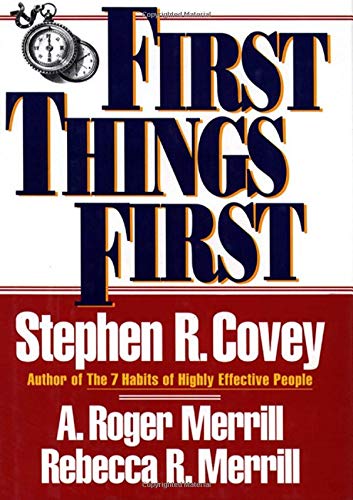
First Things First by Stephen Covey was originally released in 1996. The timeless truth of keeping “first things first” is just as relevant almost 25 years later and I feel certain that it will ring true for all of eternity. One of the greatest compliments I ever got from a teammate who serves alongside my leadership is that they appreciate the way that I keep “the main thing the main thing.” No better way to be remembered! I’m grateful for the way that Covey unpacked what it looks like to be strategic in the quest to avoid the tyranny of the urgent and focusing on the things that really matter.
I highlighted several things while reading and have posted those notes below…
- IF you were to pause and think seriously about the “first things” in your life—the three or four things that matter most—what would they be? Are these things receiving the care, emphasis, and time you really want to give them? Location: 27
- For many of us, there’s a gap between the compass and the clock— between what’s deeply important to us and the way we spend our time. And this gap is not closed by the traditional “time management” approach of doing more things faster. In fact, many of us find that increasing our speed only makes things worse. Location: 101
- More than doing things right, it’s focused on doing the right things. Location: 111
- We need to constantly be asking ourselves, “What is needed out there, and what is my unique strength, my gift?” Location: 159
- The clock represents our commitments, appointments, schedules, goals, activities—what we do with, and how we manage our time. The compass represents our vision, values, principles, mission, conscience, direction—what we feel is important and how we lead our lives. Location: 168
- for most people—even with the tremendous increase in interest and material—the gap remains between what’s deeply important to them and the way they spend their time. In many cases, it’s exacerbated. “We’re getting more done in less time,” people are saying, “but where are the rich relationships, the inner peace, the balance, the confidence that we’re doing what matters most and doing it well?” Location: 233
- We can control our choices, but we can’t control the consequences of those choices. Location: 289
- Knowing and doing what’s important rather than simply responding to what’s urgent is foundational to putting first things first. Location: 382
- THE FULFILLMENT OF THE FOUR HUMAN NEEDS AND CAPACITIES: The essence of these needs is captured in the phrase “to live, to love, to learn, to leave a legacy.” The need to live is our physical need for such things as food, clothing, shelter, economic well-being, health. The need to love is our social need to relate to other people, to belong, to love, to be loved. The need to learn is our mental need to develop and to grow. And the need to leave a legacy is our spiritual need to have a sense of meaning, purpose, personal congruence, and contribution. Location: 578
- We often go for the illusion of “cramming” instead of the reality of long-term development and growth. We’re into “get the degree … so you can get the job … so you can get the money … so you can buy the things … so you’ll be successful.” But what does that kind of “success” bring? The same character and competence that come from deep, continuous investment in learning and growth? Location: 816
- In the words of Alfred North Whitehead: In a sense, knowledge shrinks as wisdom grows: for details are swallowed up in principles. The details of knowledge which are important will be picked up ad hoc in each avocation of life, but the habit of the active utilization of well-understood principles is the final possession of wisdom.” Location: 1,063
- The Passion of Vision It’s easy to say “no!” when there’s a deeper “yes!” burning inside. Location: 1,459
- When we see our roles as segmented parts of life, we develop a scarcity chronos mentality. There’s only so much time. Spending it in one role means we can’t spend it in another. It’s win-lose—one role wins, the other roles lose. We’re in competition with ourselves. We get involved in a self-fulfilling prophecy and go about gathering evidence to justify the position we find ourselves in. But principles empower us with an abundance mentality. There’s more of everything. We can think win-win with all the roles in our lives, to see them as parts of a highly interrelated whole. Location: 1,838
- Integrity in the Moment of Choice–Quality of life depends on what happens in the space between stimulus and response. Location: 2,565
- Is it more important to get the job done efficiently … or to take the time to empower an employee or a child to do it, both now and in the future? Which choice will have greater impact on the quality of your time, the time of others, the time of the organization? Location: 3,307
- At the heart of empowerment is trustworthiness—which is a function of character and competence. Character is what we are; competence is what we can do. And both are necessary to create trustworthiness. Location: 3,949
- Your organization’s culture is the one competitive advantage that cannot be duplicated. Location: 4,457


